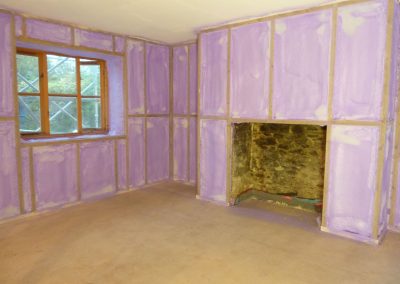Timber Framed Buildings & Barn Conversions
Recent innovations in the design and construction of timber framed buildings or repurposing of existing traditional barns by architects for housing developments and high-end bespoke projects have seen a significant rise in the preference for sprayed foam insulation over more conventional PIR boards resulting in a ringing endorsement of the product when specified for their scheme.
A sprayed foam application will inevitably outperform a board system in terms of the airtightness that can be achieved when the building is tested for certification upon completion of the construction process. Our record of customer satisfaction and continuing commercial success is based on high standards of personal attention from initial consultation and site visit to final contract completion.

It has a Class 1 surface spread of flame rating and conforms to all relevant British standards.
We have developed a close working relationship with the technical services department of our suppliers and they are pleased to be involved when additional information and advice is required, such as U-value calculations and condensation risk assessments.
Data sheets, COSHH assessments and Isotech’s Health and Safety Policy and site-specific RAMS are always available. All our employees have CSCS (Construction Skills Certification Scheme) accreditation.
A twin heated hose (210 feet maximum length) is fed from the van to the point of application. The two components mix at the tip of the spray gun under pressure and are reacting as they are applied to the roof or wall substrate.
The flow of the rising foam seals gaps in the structure and has exceptional bonding characteristics. The closed cell foam sets hard in minutes with a core density of 32-36 Kg/m3.
The depth of the foam can be varied from 25mm for anti-condensation treatments to in excess of 100mm, where very high levels of insulation are required.


A twin heated hose (210 feet maximum length) is fed from the van to the point of application. The two components mix at the tip of the spray gun under pressure and are reacting as they are applied to the roof or wall substrate.
The flow of the rising foam seals gaps in the structure and has exceptional bonding characteristics. The closed cell foam sets hard in minutes with a core density of 32-36 Kg/m3.
The depth of the foam can be varied from 25mm for anti-condensation treatments to in excess of 100mm, where very high levels of insulation are required.









